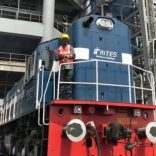Spain: The Nueva Pescanova Group promotes phase two of a project to strengthen maritime-fishing ...
Critical time to shine for Mozambique

Source: Courtesy from JGC (Japanese JGC will build a LNG platform that will produce 3.4 million tons of liquefied natural gas annually out of the sea fields off Mozambique.)
A consortium including JGC has reached a 700 billion yen ($6.33 billion) deal to build a floating liquefied natural gas platform off the coast of Mozambique, as expected demand from emerging economies rekindles interest in LNG plants despite the fuel’s languishing prices.
Developers on the project include the state-backed Italian oil and gas multinational Eni, plus China National Petroleum and Korea Gas. JGC will handle planning, procuring materials for and building the plant, together with French competitor TechnipFMC and South Korea’s Samsung Heavy Industries. JGC will handle a roughly 150 billion yen portion of the contract. The plant is aimed to start operating in the early 2020s.
The floating platform will produce around 3.4 million tons of LNG annually by tapping gas fields on the sea floor off Mozambique, in East Africa. British oil major BP will buy the entirety of the gas produced over 20 years and sell it in regions such as Asia and Europe.
The Mozambique platform is JGC’s first new LNG plant construction order since winning a project in Yamal, northern Russia, in 2013. Long-term LNG contract prices are often linked to the price of crude oil, and have been on a downward trend as crude prices have fallen.
Resource development companies’ purse strings have also tightened, and in the fiscal years 2015 and 2016 they tended to shy away from LNG plants, for which investments can come to billions of dollars.
Chiyoda Corp., a Japanese rival to JGC, likewise took no new LNG plant orders in fiscal 2015 or 2016. International competitors such as TechnipFMC and U.S. engineering firm Bechtel struggled to make deals as well.
LNG set for a comeback
There is a glut in the LNG market at present, but the prevailing view is that demand from nations including China and India should rise sharply, and demand will outstrip supply in 2023 or 2024. As LNG plants generally take about five years to complete, major investors have slipped back into action.
U.S. oil giant ExxonMobil has won government approval for a Texas LNG plant, and appears to be nearing a final investment decision toward starting construction. The company also intends to boost LNG output by one fifth in Papua New Guinea, and has taken a stake in the Eni-led Mozambique project as well. State-run Qatar Petroleum is also looking to increase its LNG output. The situation is looking brighter for plant builders.
Japan’s Mitsui & Co., a major trading house, defined oil and gas as a core field in its medium-term management plan starting in fiscal 2017, and has far-flung LNG interests, including in the U.S. and Mozambique. Competitor Mitsubishi Corp. is also investing more in production capacity in an Indonesian LNG project, and is considering participating in a massive floating storage regasification unit project in Pakistan planned by Qatar Petroleum, ExxonMobil and others.
Big investors renew interest in gas, anticipating supply pinch years down the road
LNG development requires investments of tens of billions of dollars, which can take up to 20 years to be repaid. But sellers and buyers sign long-term contracts, guaranteeing revenue regardless of short-term fluctuations in materials prices.
East Africa’s time to shine
Natural gas reserves have also been confirmed in Tanzania, which borders Mozambique to the north. These East African deposits have garnered attention in the resources industry because they also have a geographical advantage: To get there, LNG tankers do not need to pass through the Straits of Hormuz, a choke point in the Persian Gulf prone to geopolitical risk.
Mitsui & Co. and the U.S.’s Anadarko are also planning an onshore LNG plant in a nearby Mozambique mining area, but no final investment decision has yet been reached. If gas development in East Africa continues rising, it could become an LNG-exporting region to follow the likes of Qatar and Australia.
JGC’s Mozambique floating LNG platform will be its first in Africa. The plant faces fewer barriers to construction than an onshore plant, which in infrastructure-poor East Africa would require buying land and building roads and other facilities.











Leave a Reply
Be the First to Comment!
You must be logged in to post a comment.
You must be logged in to post a comment.